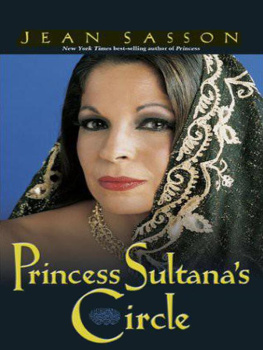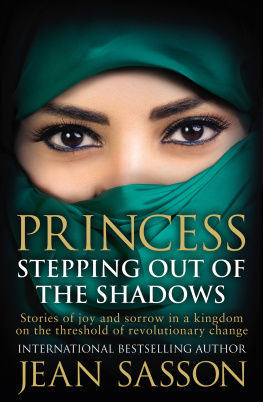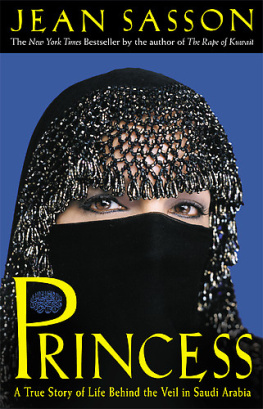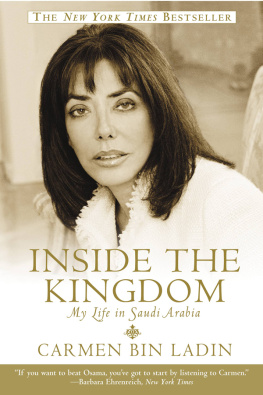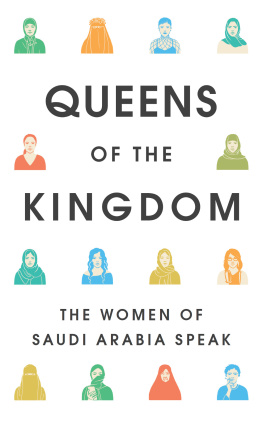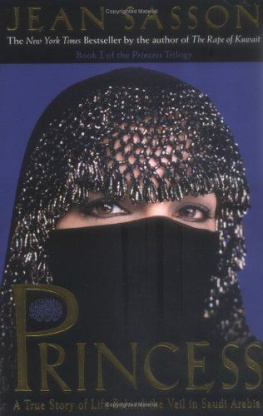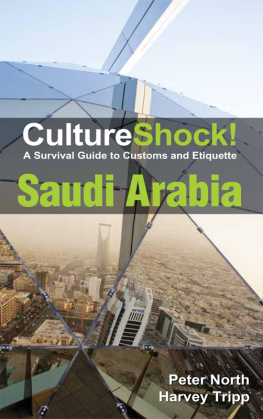To learn more about author Jean Sasson and the subjects of her books, log on to: www.jeansasson.com
A note to readers from Jean Sasson
Since the revolutions in Egypt and Tunisia, the violence in Libya, and the unrest spreading through Bahrain, Yemen, and Iran, Ive received many letters from readers who are turning to PRINCESS and its sequels, PRINCESS SULTANAS DAUGHTERS and PRINCESS SULTANAS CIRCLE. My readers want to know whether the conditions described in the PRINCESS trilogy still reflect how women are treated in the Middle East. I will now answer that question in this introduction.
As most people now know, its impossible to describe the various countries of the Middle East as one region. Although joined in spirit through the Islamic faith, and with the pull of traditional values remaining strong in most Middle Eastern lands, the cultural expectations in each country can still be vastly different from the others. While some governments have allowed humanitarian gains for their female populations, others have walked back in time. Therefore, Ill take you with me on a short walk through a number of Middle Eastern countries, providing a brief description of life for women in the year 2011.
In Algeria, women mainly stay in the home with a mere 7% of women working outside the home. Men even take care of the shopping. Marriages are still arranged by the parents of the couple, with the union considered to be a family affair, rather than a relationship between one man and one woman. Women are considered weak, and in need of male protection. Women are allowed to run for public office, but few make such attempts. In fact, Algerian law considers women permanent minors, requiring the consent of their husbands or fathers for most activities. Therefore, life for women in Algeria is still very limited when it comes to public life, and females are kept tightly under the rule of men.
In Bahrain, approximately 20% of women work outside the home, although this is changing as more women graduate from college. Although Bahrain is considered more liberal than most Middle Eastern countries, most men still consider women weak and in need of male protection. Arranged marriages are the norm although the bride and groom are often allowed supervised meetings prior to the wedding. Women are allowed to drive. There is great hope that women will continue to move forward in Bahrain.
In Egypt women work outside the home, drive automobiles and enjoy many freedoms other Arab women yearn for. Yet, there are many unsolved problems facing Egyptian women. Female circumcision is not uncommon in many regions of the country, although the more educated families have turned away from that appalling custom. Many Egyptian women complain of rampant groping should they make a trip to the market without their husbands, or a male escort. Although Egyptian women recently stood shoulder-to-shoulder with their men when calling out for democracy, now that the constitution is being re-written, women have been left out of the process.
In the Gaza Strip things are going from bad to worse for women. Due to the never-ending exchange of violence with Israel, life has always been difficult, but after the election of Hamas, life grew even more tension-filled for women. Hamas campaigned for Taliban like laws, including total segregation of women and men, and the wearing of the total Hijab. (Women in Gaza had always had the right for personal choice when it came to veiling.) Since the Hama election, some government officials have attempted to impose the most severe penalties should women not adhere to strict Islamic dress and other restrictions against the civil population, such as the promotion of polygamy, card-playing, and dating. Clearly, Palestinian women in Gaza need someone to take up their cause.
In Iraq and in Iraqi Kurdistan, womens rights have taken many twists and turns since the overthrow of the Saddam Hussein government. Few people realize that Iraqi women had achieved great gains in rights under the dictator. In fact, a 1958 law allowed Iraqi women to divorce their husbands, inherit property, study, work, and even move without the permission of the male member of the family. After the latest government came into power, women lost all previous gains. With regional control held by various tribes, women are beaten for not covering themselves in Hijab, with others being raped, womens bodies used as a weapon by tribal factions at war. It is said by many Iraqis that Iraqi women risk their lives by studying or working.
In Iraqi Kurdistan, the message for women is mixed. The parliament has banned forced marriage as well as the marriage of minors. And, polygamy has been restricted, much to the relief of many women. However, honor killings and self-immolations has reached an all-time high. Some teenagers have been killed for the crime of talking to a boy over their cell phone. Self-immolation is a huge problem, with authorities unsure whether the women are setting themselves on fire, or if family members unhappy with the women are attempting to murder the women. Despite the many set-backs, it appears that many men in Kurdistan are attempting to educate men regarding womens rights and issues. Therefore hope reigns that the Kurdish parliament will continue ruling in favor of womens issues.
Approximately 15% of the workforce in Jordan is female. Generally the female workers are single as married women are discouraged from working. Like most countries following Shariah law, divorced women lose custody of their sons when they reach age 7 and their daughters when they reach age 11. Currently the government is pushing to have the law changed so that children can remain with their mothers until they are age 12, with plans to make the age 15. Although women inherit, generally male relations pressure the women into giving up their inheritance. Because of this tendency, women own less than four percent of all property in Jordan. To the Jordanian governments credit, they are introducing new legislation to regulate inequalities between men and women. Not surprisingly, many of the hard-line religious authorities are protesting such new policies.


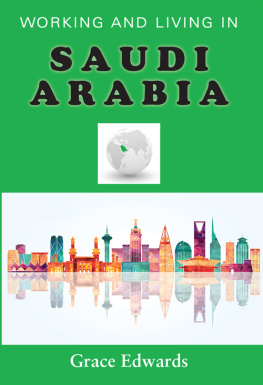
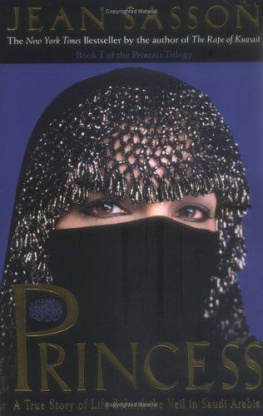
![Sasson Jean - Jean P Sasson: [Princess 02]](/uploads/posts/book/233851/thumbs/sasson-jean-jean-p-sasson-princess-02.jpg)
